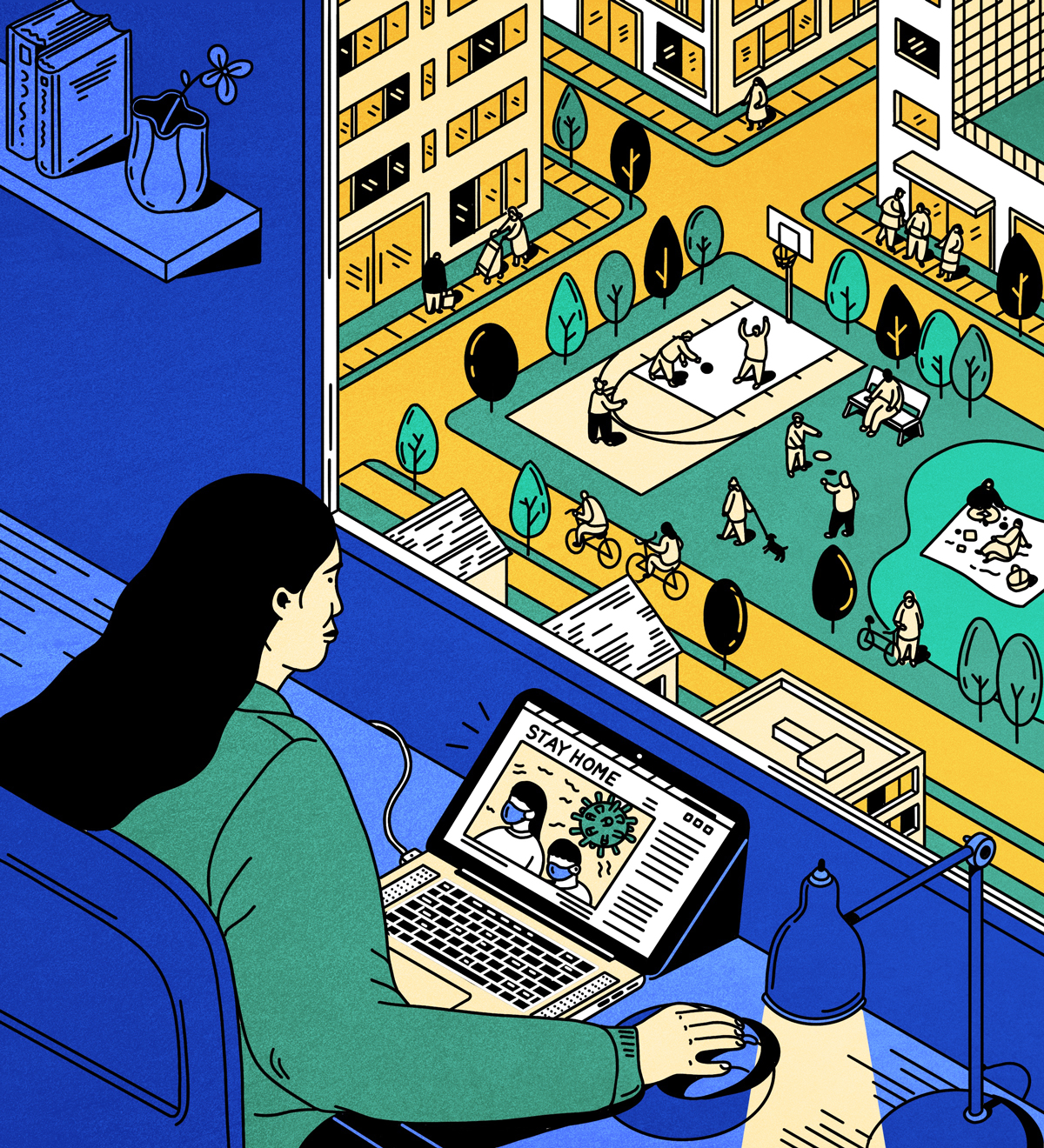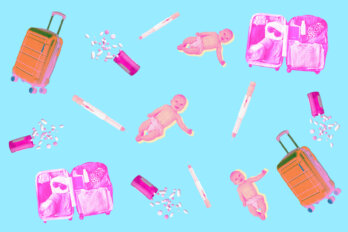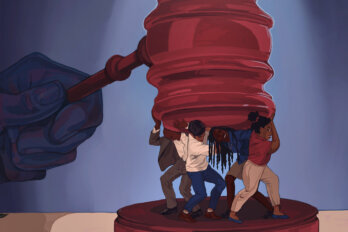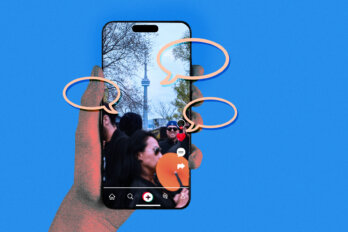One of the most jarring parts of my life under COVID-19 has involved scrolling through two very different kinds of social media feeds. Since January, whether on WeChat or Instagram, I’ve been following updates on the pandemic from people in China: details of their daily routines after weeks in isolation, their difficulties procuring food during lockdown, their ambitious self-improvement projects, and even their anger at the mismanagement of this pandemic—some of the most brazen comments against the Chinese government from within the country in recent memory. On North American Twitter, things looked very different until a few weeks ago: I saw handwashing memes, complaints about working from home, quips about travelling with discounted airfare, and a myriad of sometimes-racist coronavirus jokes.
Listen to an audio version of this story
For more audio from The Walrus, subscribe to AMI-audio podcasts on iTunes.
There’s a reason this social media divide persisted: until we were sequestered to our homes, many North Americans believed things would return to normal soon. People in the US and Canada, who expected to be shielded from this public health crisis, are just beginning to see the comprehensive systematic failures that will only continue. Chinese people have already been living with them for months.
In January, when the COVID-19 death toll was still in the double digits, I thought things would blow over quickly. My extended family lives in a province around 1,000 kilometres from Wuhan, the epicentre of the virus; many people went into self-quarantine after the Wuhan lockdown even though the threat seemed far away. When my mother, whom I live with in Toronto, purchased three gallons of isopropyl alcohol and began spritzing it everywhere, like it was a refreshing home scent, I assured her she was overreacting. Two weeks later, I woke to find her crying in the kitchen. Her brother had become one of the hundreds of health care workers who were sent to Wuhan.
When Wuhan was locked down, just before the Lunar New Year—the most important Chinese holiday—I realized that the situation uncannily resembled Severance, a postapocalyptic 2018 novel by Chinese American writer Ling Ma. I’m not the only person to notice: the book has been receiving renewed attention online, with readers marking its eerie prescience even among the newly popular genre of pandemic novels. It follows Candace Chen, a first-generation immigrant living in New York, who coordinates print jobs of elaborate bibles with a production team that’s mostly outsourced to Asia. While she works with colleagues in Hong Kong, Chinese workers begin to fall ill with an infection that turns out to be Shen Fever.
Like the novel coronavirus, Shen Fever is a disease (albeit fungal rather than viral) that spreads from an industrial centre in China and is exacerbated by the holiday travel of migrant workers. Its early symptoms mimic the common cold or lung disease. Face masks start appearing at New York Fashion Week. Full-time employees are asked to fill out a questionnaire to determine their eligibility to work from home, while more precariously employed people—security guards, bodega guys, taxi drivers—are forced to report to work even after everyone else has left the city.
But the most striking similarity between this fictional pandemic and the one we’re currently living through is how Candace and the institutions she trusted treat the outbreak as a distant threat until it is too late. In response to Shen Fever’s first outbreak, in China, Candace’s corporate office hands out personal care kits: company-branded N95 masks that employees don as a joke, hokey herbal tinctures, and nutrition bars. The pandemic begins as just another item in the news cycle that people expect to blow over. Instead, while people are looking away, Shen Fever deals a severe blow to the global economy and eventually topples civilization.
In real life, we were arguably also naive in trusting our institutions to protect us. Many of Canada’s hospitals operated at close to capacity even before the virus, such that a spike in new cases could overload the health care system. For some people, who’ve lost jobs or been otherwise affected financially, the social safety nets the Canadian government has set up are inadequate. In the US, faulty tests from the CDC and lengthy approval processes within the FDA delayed testing kits for COVID-19 by precious weeks. Over the past month, the virus has finally exposed many critical ways in which we’re vulnerable. Over 3,000 deaths in mainland China and the failures of its overwhelmed medical system were apparently not persuasive-enough examples.
Even during a growing pandemic, Candace Chen remains an ideal late-capitalist employee, a benchmark not measured by her passion for producing bibles but by her commitment to labour. Still reeling from the consecutive deaths of her immigrant parents, her grief detaches her from the world even while she remains committed to her routine. She signs a lucrative agreement with her company to keep the office open while her bosses and most of her colleagues flee the city “for the safer pastures of the countryside.” When her company’s supplier is at risk of closing, she stays in touch not out of care but for her company’s bottom line: “I want to emphasize the scale of this project,” she writes in an email, “and the opportunity that you may be turning down on behalf of your company. You are right that these are trying times, to say the least, but we are still in business and looking forward to working together.”
After she hits send, she feels a flicker of doubt at her callousness but ultimately decides that “I owed it to the client . . . I was just doing my job.”
Candace keeps commuting to work, even as the subway floods and society disintegrates, until she is possibly the last conscious person in New York. Everyone else has either come down with the fever or fled. This false sense of security puts her at great risk of getting the disease, but it also makes her an especially useful asset to her employer: even as capitalist society collapses, this millennial’s commitment to work makes it possible for business to continue as usual. (Those infected by the incurable fever become similarly zombie-like, doomed to repeat their daily routines until they die.)
When I first read Severance, I had no sympathy for Candace’s response to the fever. I thought I would be a much more diligent doomsday prepper—I would’ve at least commandeered an SUV and peeled out of New York. But now, I’m beginning to understand why she refused to see the pandemic. Until my uncle’s assignment, I didn’t want to think that the virus would be far-reaching enough to change my life. In both her world and ours, this kind of denial is a form of privilege.
In a manner typical to both Asian families and my uncle’s low-key personality, he did not say a word to us about being sent to Wuhan to care for infected patients, only telling his wife at first. We found out, of all the ways, through social media—my mom saw her brother’s name in a post from the hospital where he works, a post in which administrators praised his team’s bravery. My grandmother saw his face, behind a mask but unmistakably her son’s, on a local newscast.
After receiving frantic messages in our family group chat, he tried to reassure us with a photo of himself in a hazmat suit and gloves. His name and title and “武汉加油!” (Be strong, Wuhan!) had been scribbled haphazardly on his back by his coworkers. “Not one inch of my skin is exposed,” he told us.
My uncle has since left Wuhan and is self-isolating with members of his medical team until he can return home without the risk of infecting others. While he was still in Wuhan, apart from visualizing his safe return and sending him “good energy,” I was useless. Even asking for updates would have put a burden on him—distributing information from Wuhan is sensitive.
Surprisingly, my uncle’s assignment did not make me panic but instead marked a fundamental shift in my attention. I began to focus on the things that, at first, I had deliberately glossed over: I watched an old friend’s YouTube videos, in which he and his girlfriend demystify the lockdown in Wuhan by vlogging their grocery trips through an “empty” city with a population of 11 million. He also breaks down how a foreign media outlet twisted the couple’s vlogs to incite panic. I read first-person accounts of being attacked for being Asian in public and news about a global spike in racist attacks. I felt the looks thrown at me when I sneezed on the streetcar, and I grieved for the Chinese businesses that have seen major drops in customers since January. I heard people speak about the immunocompromised and the elderly as if they were disposable.
Like Ling Ma’s Candace, I have the privilege of sidestepping the realities of the pandemic. I can do my job from home. I have health care. My home is stocked with food. I’m not overly concerned about losing my job. Though my fear of anti-Asian violence is growing, I don’t live in a city where I’m a small minority. Unlike people whose lives were fundamentally disrupted by this crisis, I maintained the illusion of normal for longer than reality should have allowed.
My uncle’s assignment made me take an unflinching look at this crisis when it was still relatively far away. It reminded me that the threat was always closer than I thought and closer than people around me wanted to admit. But I shouldn’t have needed an uncle, a friend, or someone I know in the epicentre for it to become personal. More than ever, averting one’s gaze during a crisis means missing its approach to their own doorstep.
Until a few weeks ago, many North Americans believed there was no way that what happened in China and other countries could happen here. Distance is an obvious explanation for this naivety, but it is not the only one. This feeling of security was buoyed by the assumption that the public health and government systems in place would be able to protect us. The subtext being that viral pandemics only happen in developing countries, only to “dirty Asians.” Too bad infectious diseases don’t adhere to the confines of borders or race.
When scores of cancellations and closures populated the news in Canada and the US, I felt no surprise, only inevitability and anger. As cases mount, portions of the general public still refuse to practise social distancing or self-quarantine; international governments scramble to put together reactive initiatives. The world looked away from China’s struggles against COVID-19, missing out on lessons and precious time that could’ve left us better prepared to deal with the outbreaks elsewhere. Ignorance is not only indifferent and cruel to those who are most vulnerable—in our fundamentally interconnected world, it’s deadly. Ma tells us as much in the first lines of her book: “The End begins before you are ever aware of it. It passes as ordinary.”




